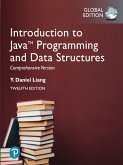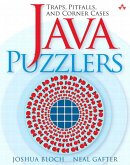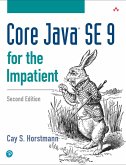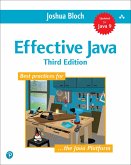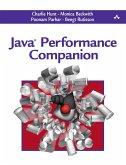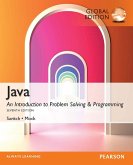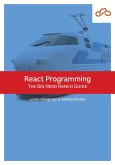Programming skills are indispensable in today's world, not just for computer science students, but also for anyone in any scientific or technical discipline. Introduction to Programming in Java, Second Edition, by Robert Sedgewick and Kevin Wayne is an accessible, interdisciplinary treatment that emphasizes important and engaging applications, not toy problems. The authors supply the tools needed for students and professionals to learn that programming is a natural, satisfying, and creative experience, and to become conversant with one of the world's most widely used languages.
This example-driven guide focuses on Java's most useful features and brings programming to life for every student in the sciences, engineering, and computer science.
Coverage includes
Drawing on their extensive classroom experience, throughout the text the authors provide Q&As, exercises, and opportunities for creative engagement with the material. Together with the companion materials described below, this book empowers people to pursue a modern approach to teaching and learning programming.
Companion web site (introcs.cs.princeton.edu/java) contains
Companion studio-produced online videos (informit.com/sedgewick) are available for purchase and provide students and professionals with the opportunity to engage with the material at their own pace and give instructors the opportunity to spend their time with students helping them to succeed on assignments and exams.
Hinweis: Dieser Artikel kann nur an eine deutsche Lieferadresse ausgeliefert werden.
This example-driven guide focuses on Java's most useful features and brings programming to life for every student in the sciences, engineering, and computer science.
Coverage includes
- Basic elements of programming: variables, assignment statements, built-in data types, conditionals, loops, arrays, and I/O, including graphics and sound
- Functions, modules, and libraries: organizing programs into components that can be independently debugged, maintained, and reused
- Algorithms and data structures: sort/search algorithms, stacks, queues, and symbol tables
- Applications from applied math, physics, chemistry, biology, and computer science
Drawing on their extensive classroom experience, throughout the text the authors provide Q&As, exercises, and opportunities for creative engagement with the material. Together with the companion materials described below, this book empowers people to pursue a modern approach to teaching and learning programming.
Companion web site (introcs.cs.princeton.edu/java) contains
- Chapter summaries
- Supplementary exercises, some with solutions
- Detailed instructions for installing a Java programming environment
- Program code and test data suitable for easy download
- Detailed creative exercises, projects, and other supplementary materials
Companion studio-produced online videos (informit.com/sedgewick) are available for purchase and provide students and professionals with the opportunity to engage with the material at their own pace and give instructors the opportunity to spend their time with students helping them to succeed on assignments and exams.
Dieser Download kann aus rechtlichen Gründen nur mit Rechnungsadresse in A, B, BG, CY, CZ, D, DK, EW, E, FIN, F, GR, HR, H, IRL, I, LT, L, LR, M, NL, PL, P, R, S, SLO, SK ausgeliefert werden.
Hinweis: Dieser Artikel kann nur an eine deutsche Lieferadresse ausgeliefert werden.
Es gelten unsere Allgemeinen Geschäftsbedingungen: www.buecher.de/agb
Impressum
www.buecher.de ist ein Internetauftritt der buecher.de internetstores GmbH
Geschäftsführung: Monica Sawhney | Roland Kölbl | Günter Hilger
Sitz der Gesellschaft: Batheyer Straße 115 - 117, 58099 Hagen
Postanschrift: Bürgermeister-Wegele-Str. 12, 86167 Augsburg
Amtsgericht Hagen HRB 13257
Steuernummer: 321/5800/1497
USt-IdNr: DE450055826
Bitte wählen Sie Ihr Anliegen aus.
Rechnungen
Retourenschein anfordern
Bestellstatus
Storno



